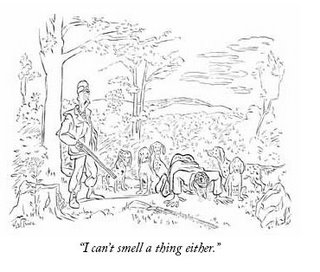 Artist : George Price Publication: The New Yorker 7 Nov 1936
Artist : George Price Publication: The New Yorker 7 Nov 1936Friedrich Nietzsche: "All my genius is in my nostrils."
Mine too! Not for its Aryan straightness -far from it, it is quite Dravidian- but for its core function-SMELLING. For me, olfactory clues are more reliable than visual ones. When I walk into a gathering or a crowd, I am concerned about the smell. If it smells well, I settle down.
Lara Feigel has written a brilliant essay “Turning up our noses” for Pospect Magazine December 2006.
She says: “Humankind, even in its most primitive form, had a brain very similar to ours now, yet we have a much weaker sense of smell than our cave-dwelling ancestors. Indeed, congenital anosmia is on the increase, so the whole human race may be heading for an anosmic future. Characteristically, Freud suggests that ancient psychosexual anxieties are behind this decline in our nasal capabilities. For him, it all began when man raised himself from the ground to walk on two feet, flashing his genitals to all and sundry. The shame of this sudden exposure, the theory goes, triggered a species-wide repression of the sense of smell. Humans found genitals less embarrassing when they were seen but not smelt. This meant that men were no longer able to smell menstruation or ovulation. Smell became less important in creating sexual excitement, and humans began to be turned on more by the look of each other's bodies than the odour. As evidence for this view of smell as a forbidden, repressed sensation, Freud cites the fact that his hysterical patients often had extremely sensitive noses…
The 17th-century poet Robert Herrick found Julia's sweat as much of a turn-on as Napoleon did Josephine's 200 years later. (He famously sent word from the thick of battle that she should abstain from washing now that his return was nigh.) ”
I don’t want to be part of such an anosmic future when I have to say : “I can’t smell a thing”. I would rather be Freud’s hysterical patient!
No comments:
Post a Comment